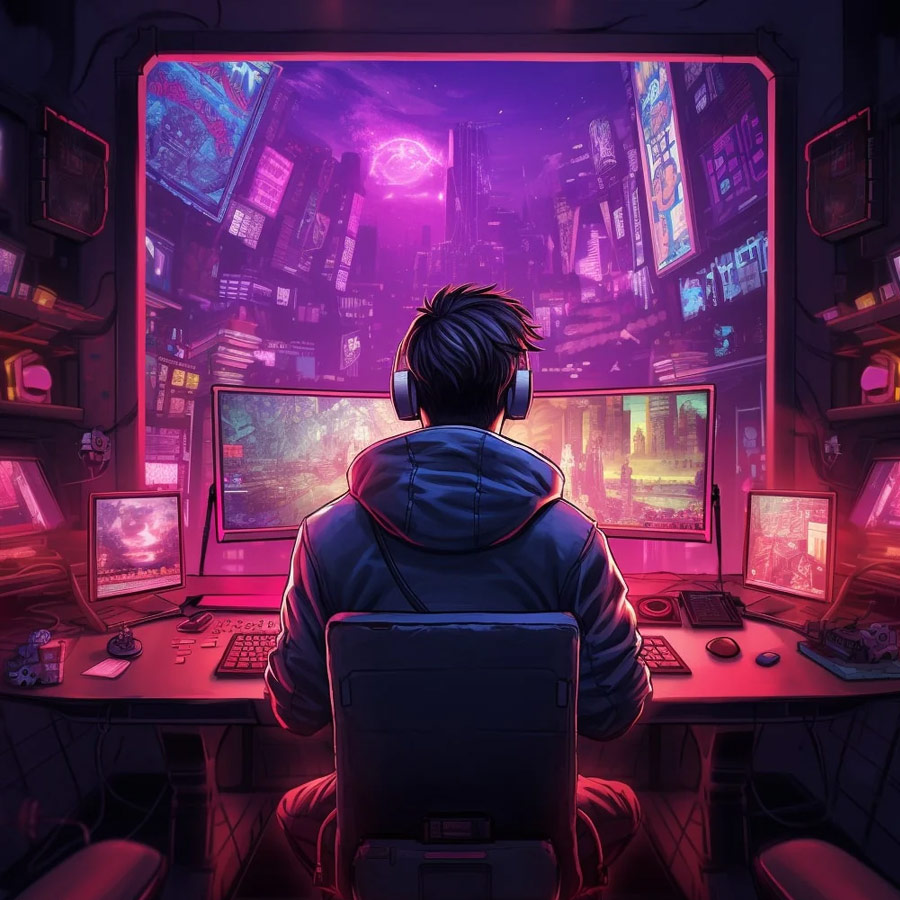Video games have long ceased to be just a pastime for teenagers. Today, they are a multi-billion-dollar industry that influences cinema, music, sports, and even social movements. In this article, we’ll talk about those games that not only made history but fundamentally changed the rules, setting new standards for the industry. Each one is a milestone that has left an indelible mark on gamers and developers worldwide.
DOOM (1993) — The Birth of First-Person Shooters
When DOOM appeared in 1993, it forever changed the gaming world. Before this, the first-person shooter genre was still in its infancy, but DOOM took it to a new level. Developers at id Software gave gamers something they didn’t expect: an adrenaline-pumping mix of dynamic gameplay, a dark atmosphere, and unprecedented 3D levels. This wasn’t just a game—it was a whole new experience.
DOOM laid the foundation for countless first-person shooters, and today, we see its influence in hits like Call of Duty and Battlefield. Furthermore, DOOM catalyzed the popularity of online multiplayer games, turning gamers into true gladiators on virtual arenas.
The Sims (2000) — Life Simulator
Who hasn’t dreamed of playing God and controlling other people’s lives? The Sims didn’t just offer another strategy game—it created a reality where you could do literally anything. This game became a phenomenon due to its unique approach: you could build houses, create families, manage their lives, and even orchestrate love triangles and disasters at will.
But the most interesting part is that The Sims laid the groundwork for an entire genre of life simulators. Without this game, we might never have seen other popular titles like Animal Crossing or Stardew Valley, which are also in vogue today.
World of Warcraft (2004) — A World That Never Sleeps
When it comes to massively multiplayer online role-playing games (MMORPGs), World of Warcraft is the pinnacle. It didn’t just change the genre—it created a new culture. Millions of players around the world have spent years immersing themselves in the fantasy world of Azeroth, battling dragons, exploring dungeons, and forming alliances with strangers.
WoW not only transformed multiplayer games but also brought a new type of interaction into people’s lives. It spawned clans, guilds, and entire player communities that live and breathe this game. Even today, it remains the gold standard for MMORPGs, captivating millions of fans worldwide.
Grand Theft Auto III (2001) — Freedom of Action
When Grand Theft Auto III hit consoles in 2001, the gaming world was never the same. This wasn’t just another cops-and-robbers game—it was a whole virtual world where the player could do anything. Drive around the city, rob banks, or cause chaos on the streets—it was all possible in the open world.
This game revolutionized the concept of open worlds and sandbox gameplay. It showed that a game didn’t have to be a linear story but could be a sandbox where players created their own scenarios. Today, games like Red Dead Redemption and Cyberpunk 2077 owe their existence to GTA III’s success.
Minecraft (2011) — Creativity Without Limits
Minecraft is a phenomenon that turned the gaming industry upside down with its approach to world-building. Without storylines, goals, or time limits, players were given complete freedom to create. Build whatever you want: from a simple house to an entire city, from a humble farm to a spaceship.
This blocky masterpiece proved that graphics aren’t what make a game popular—it’s creativity and possibilities. Today, millions of players worldwide continue to build their worlds, and Minecraft not only inspired a generation of creators but also started a trend for creative gameplay.
The Witcher 3: Wild Hunt (2015) — The Art of Storytelling
The Witcher 3: Wild Hunt took narrative-driven games to a new level. It’s not just an RPG—it’s a masterpiece of storytelling, visual art, and gameplay. The story of Geralt of Rivia immerses the player in a world full of moral dilemmas, tough decisions, and thrilling events.
The Witcher 3 showed that games can be true art and gave a push to the development of RPGs that emphasize rich characters and narratives. Without its success, we might not have seen hits like Cyberpunk 2077 or Horizon Zero Dawn.
Diablo (1996) — The Beginning of the Hack-n-Slash Era
Diablo from Blizzard Entertainment was a revolution in the genre of role-playing and action RPGs. It gave gamers what they craved: a dark atmosphere, haunting music, and nonstop battles with hordes of demons. But most importantly, Diablo laid the foundation for the hack-n-slash genre, where character progression, loot collection, and endless dungeons became key elements.
This game essentially set the tone for the entire ARPG genre, inspiring titles like Path of Exile and Torchlight. Its multiplayer mode through Battle.net was a true innovation, making Diablo iconic for gamers worldwide.
Heroes of Might and Magic III (1999) — Strategy with an Eternal Soul
Heroes of Might and Magic III is rightly considered one of the best turn-based strategy games in history. It has captured the hearts of gamers so deeply that it continues to gather fans, even after all these years. The vast number of races, magical artifacts, and captivating castle sieges created a cult that has lived on for decades.
HoMM III offered a unique blend of strategic depth and engaging storytelling, and its influence can be seen in many modern strategy games like Age of Wonders or King’s Bounty. It’s a game you want to return to over and over because its magic never fades.
Need for Speed: Underground (2003) — Speed as a Lifestyle
Need for Speed isn’t just about racing—it’s a lifestyle. But with the release of Need for Speed: Underground in 2003, racing games took on a new dimension: street racing, car tuning, night tracks, and dizzying speeds. This game immersed players in street culture, and many of us have dreamed of driving through a night city in a perfectly tuned car to the sound of a powerful soundtrack.
Need for Speed: Underground inspired a whole wave of racing games and car-tuning culture. It paved the way for hits like Midnight Club and Forza Horizon, and even today, NFS remains a symbol of street racing in the gaming world.
FIFA (1993 — Present) — Football on the Screen
FIFA isn’t just a game—it’s an era for football fans. The series from EA Sports started back in 1993, but year after year, it evolved, turning virtual football into a real simulation. FIFA brought realism to games, where every pass and shot looked like a real match. Over time, it became an integral part of culture, even for those who don’t follow football.
Moreover, FIFA laid the foundation for eSports, opening the door to major tournaments like the eWorld Cup. It’s a symbol not only of football culture but of sports games in general, continuing to delight millions of players worldwide.
These games have left their mark on history and set the benchmark for future developments. Each of them, in its own way, changed the industry—whether by creating new genres, advancing multiplayer modes, or immersing players in the world of simulators and strategies.


















